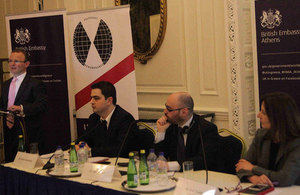‘Perception of the Holocaust and of Anti-Semitism in Greece’
The British Embassy organised today an event on the presentation of the findings of the survey on ‘Perceptions of the Holocaust and of Anti-Semitism in Greece’. The event that took place at the British Residence was under the auspices of the UK International Holocaust Remembrance Alliance (IHRA) Chairmanship which the UK assumed in February 2014.

The survey was funded by the British, Canadian and Romanian Embassies in Athens and focuses on the Holocaust, its memory and the reactions it generates among the Greek public opinion. The study was carried out in January 2015 and was administered by the University of Macedonia in Thessaloniki; it comes as a continuation of a previous survey carried out in 2014. The two surveys concluded that ‘anti-Semitic attitudes and negative perceptions of the Holocaust are worryingly high among Greek public opinion’.
Addressing the event and joined by the Ambassadors of Canada Robert Peck, Romania Lucia Fetu and Hungary Eszter Sandorfi, the British Ambassador John Kittmer said:
We are delighted to have co-funded with our Canadian and Romanian colleagues this important survey on ‘Perception of the Holocaust and of Anti-Semitism in Greece’. Across Europe we are worried of the resurgence of anti-Semitism. It is important that we all engage in the struggle against it. The British Government is firmly committed to the struggle against anti-Semitism and other forms of racism and proper knowledge and understanding of the Holocaust is key to the avoidance of its repetition.
The presentations on the findings were made by Professor Nikos Marantzidis, Associate Professor Elias Dinas and Dr George Antoniou. Speakers included: Dr Jonathan Boyd of the Institute for Jewish Policy Research in the United Kingdom and Associate Professor Vassiliki Georgiadou. The discussion was moderated by former PASOK MP, Costas Triantafyllos. The event was attended by representatives from the media, academia and Government officials.
At the end of the month the findings of the survey will be presented also in Thessaloniki, Greece.
Notes for editors:
-
The Survey: Sample: 1,043 respondents over 18 via a multistage quote random sample. Fieldwork: 10-14 January 2015. Data Collection: University of Macedonia, Public Opinion Research Unit, Supervisor and Head, Dr Iannis Konstantinidis, Assistant Professor. Method of Data Collection: CATI (Computer Assisted Telephone Surveys). Response Rate: 6510 calls made, 1038 interviews completed (16%). For further information on the survey, please contact Associate Professor Elias Dinas and Dr George Antoniou.
-
The survey is divided into three sections. The first section presents overall descriptive patterns on questions about the Holocaust. The second part looks into the relationship between partisanship, ideology and people’s perceptions about the Holocaust. The third part presents the results of an experiment to shed light on what is thought to be a key determinant of anti-Semitic attitudes in Greece, namely a profound sense of victimisation.
-
The UK was one of the three founding members of International Holocaust Remembrance Alliance (HRA) and an original signatory of the Stockholm Declaration of 2000. The UK held the IHRA Chairmanship for the first time in 1999.
-
IHRA currently has 31 member countries and eight observer countries. Membership is open to all countries, and members must be committed to the Stockholm Declaration and to the implementation of national policies and programs in support of Holocaust education, remembrance, and research. Member countries are encouraged to develop multilateral partnerships and to share best practices.